The almond is an ultra-healthy and energy-dense source of antioxidants, omega-3 fatty acids, and a range of other nutrients that can improve your cardiovascular health, protect your DNA from damage, and even help you control your weight.
They are a great replacement for unhealthy snack foods that are high in refined carbohydrates and low in the healthy kinds of fats and fiber like almonds.
If you need a better snacking food, we’ve ranked the ten best almond brands according to quality. Read on for our rankings and for more on the science behind the health benefits of almonds.
Research
Rankings
1. We Got Nuts Jumbo California Almonds

If you eat a lot of almonds on a regular basis, We Got Nuts Jumbo California Almonds is the way to go.
This giant four-pound bag of almonds is unroasted and unsalted, and to top it off, the bag is easy to reseal. With all of these perks, it’s our top pick.
2. Ellie’s Best Raw Sweet Almonds
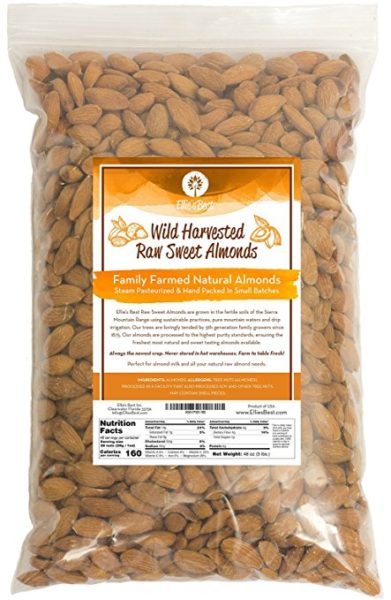
Ellie’s Best Raw Sweet Almonds comes in a three pound bag and uses a natural steam-based process to pasteurize their almonds instead of the chemical based process used in other almond brands.
If you are particularly conscious about the chemical contents of your almonds, Ellie’s Best is a great pick.
3. Blue Diamond Lightly Salted Almonds
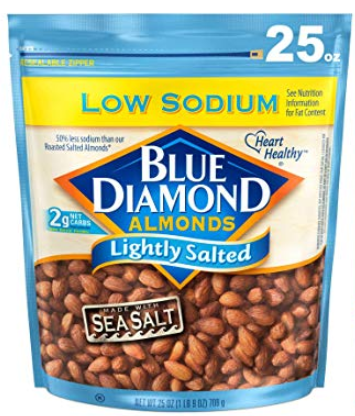
Blue Diamond is in many ways the king of almond brands, but their best product is their lightly salted and roasted almonds.
For people with a taste for salty foods, it’s hard to satiate that in a way that’s healthy and doesn’t drive up your sodium intake too much.
hese roasted almonds are a perfect option if that’s the case for you. There are better options out there for raw almonds, but when it comes to roasted almonds, these are the best.
4. Sunbest Raw Almonds
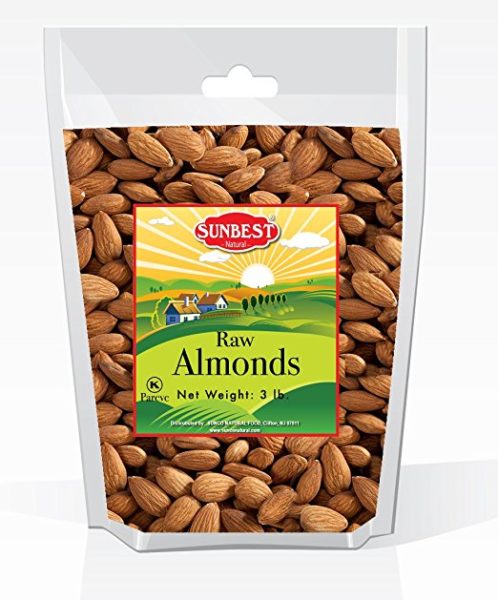
Sunbest Raw Almonds are plain, simple, unroasted almonds.
These California grown almonds have no salt added and are pasteurized for safety, so if you aren’t too picky about the specifics and just want an easy source for unroasted almonds, it’s a great pick.
5. Trader Joe’s Nuts Raw Almonds
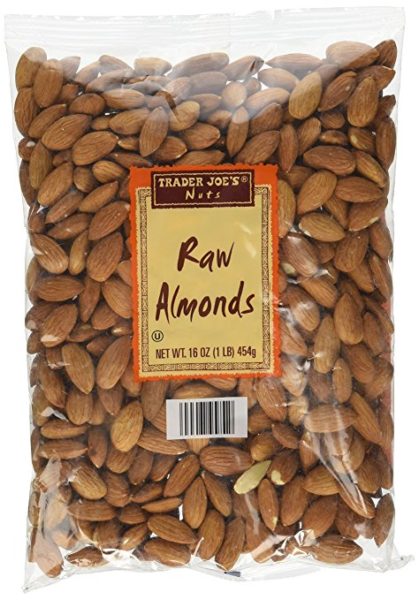
Trader Joe’s Nuts Raw Almonds are a great source of almonds for bulk users. They come in a plastic bag that’s not resealable, but all you need is a plastic container to keep these almonds fresh and they are a great addition to your pantry.
6. Wonderful Almonds
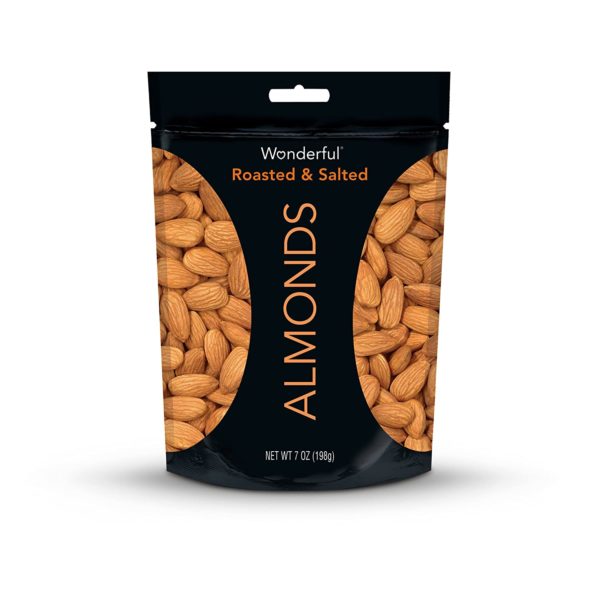
For quick and healthy snacking on the go, there’s no better option than Wonderful Almonds. This seven ounce bag is roasted, salted, and small enough to toss into your lunch box or keep in your car for a healthy snack.
7. Terrasoul Superfoods Raw Whole Almonds
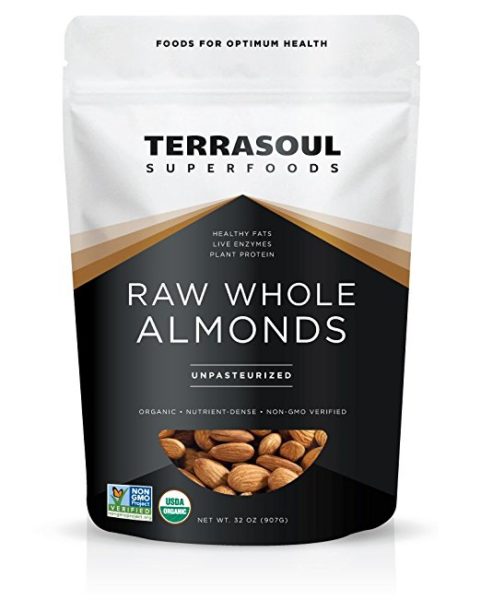
Terrasoul Superfoods sells almonds that are as raw as it gets. These certified organic raw almonds are unpasteurized, meaning they retain all of the natural enzymes present when the almond is picked off the tree.
This also means that the raw almonds are sproutable at home if you want to make your own sprouted almonds.
People who are food safety conscious or people with children might want to choose a pasteurized product, though, because the pasteurization process also kills bacteria like salmonella.
8. Kirkland Signature Marcona Almonds
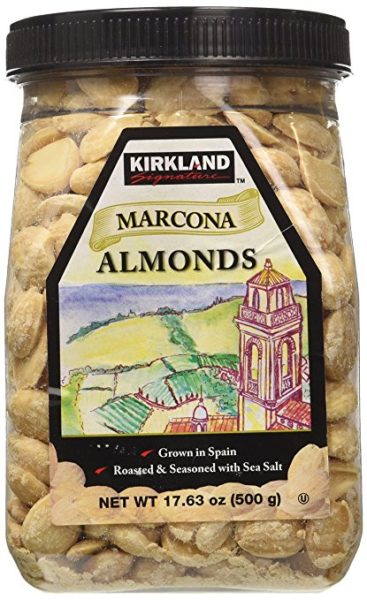
Kirkland Signature Marcona Almonds come from the marcona almond tree, which is native to Spain and produces a softer and sweeter almond than the classic California-grown almonds you are probably used to.
These almonds are great if you are looking for a change up from the usual taste and texture that you get in all of the other almonds on the market.
9. Happy Belly Whole Almonds
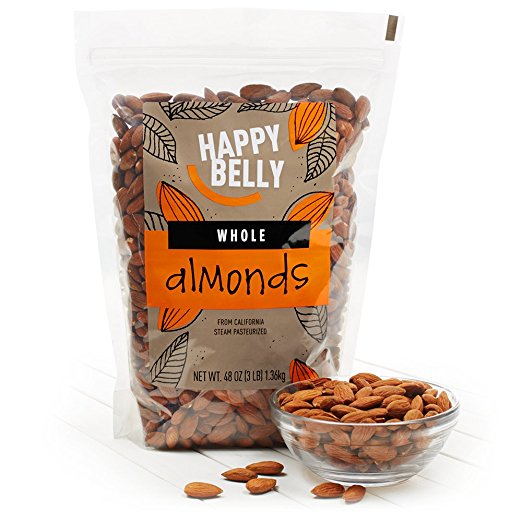
Happy Belly Whole Almonds is an in-house brand for Amazon that packages and sells California-grown and pasteurized almonds in a resealable two pound bag.
While these almonds aren’t the best-tasting, they are still an okay option for bulk users.
10. Mariani Sliced Premium Almonds
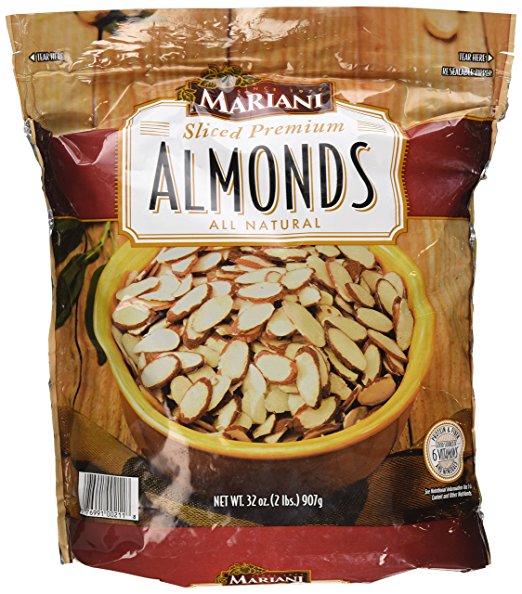
Pre-sliced almonds like Mariani’s are a good choice if you need a dead-simple and fast way to add almonds to salads, oatmeal, and yogurt.
However, pre-sliced almonds might not retain quite as much antioxidant power, since the surface area is increased, and more of the compounds inside the almond are exposed to oxygen. Still, for simplicity and ease, it’s not a bad pick.
Category winners
Best almonds overall: We Got Nuts Jumbo California Almonds
We Got Nuts makes raw, unsalted almonds that are grown in California and taste great. You can eat these raw, or roast them yourself with your own choice of spices. With all of these pros and no real cons, these are our overall top pick.
Best roasted almonds: Blue Diamond Lightly Salted Almonds
Blue Diamond makes excellent roasted almonds that have just enough flavor from roasting and salting to be savory and crunchy, but don’t go overboard on the sodium—an important consideration if you’re incorporating almonds into your diet for heart health.
Best raw almonds: We Got Nuts Jumbo California Almonds
Want to keep things as unprocessed as possible? We Got Nuts has great raw almonds that are neither roasted nor salted. Whether you’re using them in a recipe or as a raw food snack, they’re unbeatable when it comes to healthy snacking.
Best unsalted almonds: We Got Nuts Jumbo California Almonds
Keeping your sodium intake low for heart health? We Got Nuts is our recommendation. These unsalted raw almonds help you take full advantage of the heart health benefits of almonds, and are fully compatible with low sodium diets like the DASH diet.
Best organic almonds: Terrasoul Superfoods Raw Whole Almonds
Organic almonds are notoriously hard to find, since almond trees are typically heavily treated with fertilizers and pesticides. Terrasoul breaks this mold with organically certified and 100% unprocessed raw almonds. If purity is important to you, there’s no better option than Terrasoul.
Best bulk almonds: Ellie’s Best Raw Sweet Almonds
If you’re relying heavily on almonds as a big part of your diet, Ellie’s Best is the right call—coming in bulk bags of three, five, or ten pounds, these bulk raw almonds are perfect for paleo, keto, and Whole30 dieters.
Who should buy almonds?
Almonds are great for all adults but may especially beneficial to those looking to lose weight. Almonds are also safe for pregnant women and children.
If you have another nut allergy, you should be cautious when consuming almonds or derived almond products like almond butter or almond milk.
How we ranked
Almonds come in a variety of forms raw, roasted, blanched, sliced, whole, halved and diced. For our rankings, we did have a slight preference for whole un-roasted almonds like Terrasoul and Ellie’s Best, because they tended to be the freshest and provide the most nutrients (roasting can destroy some nutrients). Pre-sliced almonds, like Mariani, ranked lower in general because they tend to lose some of their nutrients and antioxidant power.
Salted almonds, like Blue Diamond, were not preferred since many people consume to much salt anyway – and it’s easier to overeat salted almonds than unsalted.
Almonds tend to come from a few places, mainly California and Europe. There was no major preference from the destination, but it’s important to know that almonds from Spain tend to be sweeter than their American counterparts.
We also looked at packaging. We preferred companies like We Got Nuts that came with easily resealable packaging to extend the shelf life of the almonds and keep them fresher for longer.
Benefits
Almonds are the edible seed of the almond tree, and are loaded with vitamins, minerals and antioxidants. While almond trees are native to the Middle East, America is now the top producer of almonds worldwide. These nuts are available both raw and roasted, and are usually purchased with the shell removed; if the package states almonds are “natural,” it means they’re raw.
A single ounce of almonds amounts to a small handful, and contains about 160 calories, with only 2.5 grams of digestible carbohydrates, 6 grams of protein and 14 grams of fat; you’ll also get roughly a third of the RDI for vitamin E and manganese, as well as 20% of the RDI for magnesium. (1)
Some of the fat in almonds passes through the system undigested because it’s difficult for the body to break down and access. (2, 3)
Almonds contain zinc, calcium and iron as well, but the binding action of phytic acid inhibits the absorption of these minerals.
Almonds are an excellent source of antioxidants. Antioxidants neutralize free radicals in living organisms, reducing oxidative damage by free radicals that can contribute to aging and the development of disease. (4, 5)
Most of the antioxidants in almonds are found in the outer layer of brownish skin, so blanched almonds with the skin removed won’t have as many antioxidants. (6)
Oxidative stress markers decreased by 23% to 34% in 60 male smokers who added 3 ounces of almonds daily to their diets over a month’s time. (7)
In another study, participants ate almonds with their main meal each day, reducing certain markers of oxidative stress during the trial. (8)
The vitamin E content of almonds can also protect cell membranes against oxidative damage; these fat-soluble antioxidants collect in membranes and are linked with lower rates for developing heart disease and cancer, as well as Alzheimer’s disease. (9, 10, 11).
Almonds help regulate blood sugar and protect your heart. The nutritional profile of almonds makes them a perfect food for diabetics. High fiber and protein content, coupled with healthy fats and low carbs, acts as a natural blood sugar regulator because it slows the inflow of glucose into your bloodstream.
Magnesium is vital for more than three hundred physical functions including the regulation of blood sugar, and is found in generous amounts in almonds. (12)
Studies show that up to 38% of patients with type 2 diabetes are magnesium deficient; correcting this problem has positive effects on insulin function, as well as dropping blood sugar levels. (13, 14)
Insulin resistance in diabetics also shows improvement when magnesium is added to the diet. (15)
Because almonds are rich in magnesium, adding them to the diet could act as a preventive measure for both type 2 diabetes and metabolic syndrome.
Another medical condition positively affected by adequate magnesium supplies is hypertension, or high blood pressure.
Low levels of magnesium are strongly linked to this disorder, which is not always associated with obesity and sometimes occurs in patients of normal weight. (16, 17)
Blood pressure can be reduced by correcting magnesium deficiency, and almonds are an excellent natural source of this important mineral. (18)
Almonds could also help reduce your cholesterol levels. Dietary choices have powerful effects on cholesterol levels, and studies show eating a handful or two of almonds daily can reduce LDL cholesterol (the bad kind), which is a major risk factor for developing heart disease. Keeping the levels of this biomarker low is a major help for improving your heart health.
In a 4-month trial, 65 participants who were pre-diabetic dropped HDL cholesterol levels by 12.4 mg/dL through eating 20% of daily calories in almonds. (19)
Another controlled trial lasted six weeks, comparing changes in LDL cholesterol measurements of subjects who ate 1.5 ounces of almonds a day against those who didn’t.
LDL levels went down an average of 5.3 mg/dL while HDL cholesterol (the good kind) remained stable. The group eating almonds also reduced their belly fat. (20)
Almonds can trigger other positive changes in LDL cholesterol as well.
In laboratory studies with animals and test tube experiments, LDL cholesterol oxidized at lower rates when the antioxidants in almonds were present. (21, 22)
High ratios of oxidized LDL particles in serum lipid levels are a major risk factor for heart disease.
In a month-long study of subjects who snacked on almonds, levels of oxidized HDL cholesterol fell by 14%. (23)
This wide range of studies demonstrates that almonds have beneficial effects on blood pressure, which can probably be attributed to their high contents of monounsaturated and polyunsaturated fats.
Almonds are a weight-loss friendly food. The unique nutritional profile of almonds can also help with weight control, which is perhaps surprising given that almonds are fairly energy-dense due to their relatively high fat content.
Almonds are low in carbs and high in both protein and fiber, which is the ideal combination for feeling satisfied after eating. These seem to more than offset the high energy density of almonds.
Studies show when test subjects experience a higher satiation level, they consume fewer calories during the day. (24, 25)
During a month-long study with more than a hundred participants, 1.5 ounces of almonds eaten over the course of the day decreased hunger levels, as well as the desire to eat. (26)
Other clinical trials confirm the satiating effects of tree nuts, including almonds, on appetite. (27)
Besides the fact that the body doesn’t absorb all the fat in almonds, it appears that there may be a metabolism-boosting effect as well. (28)
In some cases, the effects of eating almonds can be dramatic for weight loss.
One study indicated participants eating a low-calorie diet dropped 62% more weight when they ate 1.5 ounces of almonds daily than the control group who snacked on foods rich in complex carbohydrates. (29)
Another study with 100 overweight female subjects who included nuts in their diet supported these findings. Nuts appeared to contribute to more weight loss, and significant improvements in waist circumference and other important health markers were also noted. (30)
Even though almonds are fairly energy dense, their high fiber content and unsaturated fat levels makes them a great food to include in a weight loss routine.
Side effects
Like all tree nuts, some people have allergies to almonds, and reactions can be life-threatening when severe. (31)
Almonds are one of the many foods that can also contribute to the formation of kidney stones due to the oxalate content. (32) Don’t eat too many almonds if you’ve had trouble with this health issue.
The phytic acid content of almonds can limit mineral absorption, but this effect is time-sensitive, so subsequent meals are not impacted. (33)
Binge eaters seem to have difficulty controlling nut consumption; if you’ve had trouble with this behavioral pattern, you may need to be careful with almonds.
FAQ
Are almonds good for you? Yes, almonds are good for you and provide a variety of benefits. Among these benefits are reduced appetite, body fat levels, and even cholesterol in overweight and obese individuals.
What kind of forms do almonds come in? Almonds are easy to consume, as they are available in many different products. These products include raw and roasted almonds, almond butter, and almond milk, among others.
When should you eat almonds? When you eat almonds is often based on your personal preference; however, there is evidence that timing how you eat almonds can affect your health in a positive way.
In one particular study, participants ate almonds prior to consuming meals, and after 16 weeks, the participants eating almonds prior to meals experienced greater decreases in body weight and body fat, as compared to a control group. Additionally, this study concluded that eating almonds as a snack during the day can result in improved cholesterol levels, which shows that eating almonds at any point in the day can provide its own benefits (34).
How many almonds can you eat in a day? Depending on your reasoning for eating almonds, the number of almonds you eat per day will greatly vary.
One serving of almonds is considered to be about one ounce (around 30 almonds), but studies are looking to determine the connection between almonds and reduced weight, and other positive benefits sometimes require study participants to consume up to three servings per day.
It is important to remember that, despite the fact that almonds include healthy fats, they still have higher fat levels in relatively small serving sizes. If you are looking to reduce body fat or consume low-fat foods, you should eat almonds in limited amounts and follow serving size directions as much as possible.
Is it bad to eat a lot of almonds? Eating almonds provides many positive benefits to consumers, but like any food or supplement, eating too many can result in negative health consequences.
The greatest impact of eating large quantities of almonds is the increased risk of weight gain. With a serving size of one ounce, you can eat one serving of almonds relatively quickly, which equals to about 160 calories and 15 grams of fat per serving. Eating almonds in large quantities or more frequently, could lead to weight gain and higher levels of body fat.
Another potential issue associated with overeating almonds is gastrointestinal upset due to a high level of fiber content. If you consume almonds at the recommended serving size, you should experience no significant issues.
How do you eat almonds? There are several ways to eat almonds. One method includes soaking the almonds in water, which could have positive effects on the digestive process of the food, as well as other potential benefits.
The other common method involves eating almonds raw, which circumvents the soaking process. Almonds also come in a variety of products, such as almond milk and almond butter.
Should you drink almond milk? Yes, almond milk is very nutrient-dense, just as regular almonds are. It’s a low-sugar option that also provides decent levels of calcium, vitamin D, and vitamin E, without the high-fat content.
Almond milk does not include any dairy products and allows those with dairy intolerances, or diabetes, to receive nutritional benefits without causing issues.
Can you eat raw almonds? Yes, you can eat raw almonds since they provide the same or better health advantages as the roasted variety.
Roasting almonds can lead to the loss of some nutritional value when it comes to almonds, making raw almonds the purest form of almonds you can eat. Raw almonds may cause GI distress in certain individuals, so you’ll need to experiment and find your preference.
What are the benefits of almonds? Almonds are a highly-studied food that scientists are analyzing to determine the effects it has on humans and health.
When eaten as snacks, almonds are scientifically proven to reduce the feeling of hunger and appetite in those consuming the food.
Other studies connect snacking on almonds to reduced blood cholesterol levels. There is also additional evidence that eating almonds prior to meals can reduce body fat and body weight when consumed daily for weeks at a time (35).
Almonds have also proven beneficial to those with increased risks of developing chronic diseases, such as diabetes and cardiovascular diseases. One study notes that almonds can affect body weight, glucose levels, and even inflammation within the body, which can help those affected by those medical conditions (36).
The health benefits of almonds are likely extraordinary due to the nutritional content of almonds, which includes high levels of micronutrients beneficial to the maintenance and development of the body.
What is the nutritional value of roasted almonds? Roasting almonds can affect the nutritional value found in almonds naturally. During the process of roasting, healthy fats may be lost, and nutrients like Vitamin E and antioxidants may be sacrificed as a result.
In one serving of roasted almonds with salt, you can expect to consume about 15 grams of fat, 6 grams of protein, over 3 grams of fiber, and over 200 milligrams of potassium and some sodium.
Though nutrients are likely lost during the process of roasting these almonds, they still provide great health benefits and are rather nutrient-dense when compared to other foods.
Why are you supposed to soak almonds in water and peel the skin off?
The most common reason that people soak almonds in water is to enhance the digestion of the almond. When soaked, almonds are significantly softer and more easily digested, and some suggest that this is a healthier consumption method.
The other major reason for soaking almonds is to remove the skin from the surface of the almond. Many reports show that consuming almonds with their skin intact prevents the ability of the body to absorb the nutrients in the almonds. However, it is not required to soak almonds and peel the skin, as almonds can also be consumed raw.
Why are almonds so expensive? Almonds are perhaps one of the most expensive nuts on the market today. The most significant reason for the higher price of almonds is high demand and low supply.
In addition, it is expensive to grow and harvest almonds, with the process taking longer than other nuts or food products. As people are beginning to recognize the increasing health benefits of almonds, they are also more willing to spend more money on the product to reap these benefits, further increasing the prices.
Are almonds considered a seed? Almonds are not considered nuts, but rather a drupe. Almonds fit this classification because of the physical makeup of the almond when grown and picked. In particular, the definition of a drupe requires a hard shell surrounding the actual seed, which describes how almonds are grown.
Can almonds help you lose weight? There are studies that have been conducted in recent years that have identified a link between eating almonds and weight loss.
One of the major reasons this may be the case is because almonds are proven to reduce appetite and hunger levels. A reduction in appetite often results in less food consumption, which long-term, can result in weight loss. Many studies have discovered that eating almonds before meals causes weight loss in those continuing this behavior for several weeks in a row.
Are almonds good for the brain? The connection between almonds and brain health is due to the levels of Vitamin E found in every serving of almonds.
Vitamin E has been proven to repair cells in the body that are damaged and extend the life of cells within the body. This is significant when it comes to the brain, as it can prevent the degradation of brain cells and the development of diseases like Alzheimer’s Disease.
Laboratory studies have also shown that consuming almonds on a daily basis can boost acetylcholine levels in the brain and thus improve memory in patients (37).
Which plant do almonds come from? Almonds come from almond trees. The actual almonds themselves come from the almond fruit, which is considered drupes (not nuts). Once picked, the almonds themselves are removed from the inside of the drupes, producing what we consider to be “almonds.”
Where do almonds grow? In terms of physical location, the majority of almonds are grown in the United States, particularly in the state of California.
Almonds are grown worldwide and are also a popular product in Spain and Italy, among other regions of the world.
Is almond butter healthier than peanut butter? Almond butter and peanut butter are very similar, but almond butter is generally seen as more nutritious and nutrient-dense than peanut butter.
The most significant nutritional difference between almond butter and peanut butter are the levels of saturated fat, fiber, and sugar. In a one-tablespoon serving, almond butter has 1.6 grams of fiber, 0.7 grams of sugar, and 0.7 grams of saturated fat. On the other hand, peanut butter has 0.8 grams of fiber, 1.7 grams of sugar, and 1.7 grams of saturated fat.
Can almond milk be used when cooking? Almond milk can be used as a substitute for regular milk in a majority of baking recipes. For the most part, you can assume that if your recipe requires one cup of milk, you can use one cup of almond milk to replace it.
Before replacing regular milk with almond milk in a recipe, you should check to see if there is any variation in the amount of milk needed in such a circumstance. There is a chance that you’ll need more or less almond milk than regular milk slightly.
Is almond milk considered a dairy product? Almond milk does not include any dairy-derived ingredients and is therefore not considered a dairy product. This makes almond milk a great alternative to regular milk and can be used in the same exact way, whether you are drinking it or adding it to a baking recipe.
How do you grow an almond tree? Almond trees are fairly easy to grow as long as you have space since the tree is capable of reaching a height of about 30 feet.
The best thing you can do while growing an almond tree is maintaining the tree during all seasons of the year. This includes pruning the tree, fertilizing the soil, and watering the tree frequently to promote adequate growth.
Related Articles
Recap
Almonds are an excellent health-friendly snack food that make a great replacement for heavily salted and refined-carb rich foods like chips or popcorn. Almonds pack a strong nutritional punch thanks to their high antioxidant content, and help satisfy appetite, control blood sugar and improve health markers associated with heart disease.
On top of that, they could also be useful for weight control, thanks to their high fiber content in combination with their high levels of healthy fats. When it comes to natural snack foods, the almond is one of the best.
For BodyNutrition’s #1 almond recommendation, click here.